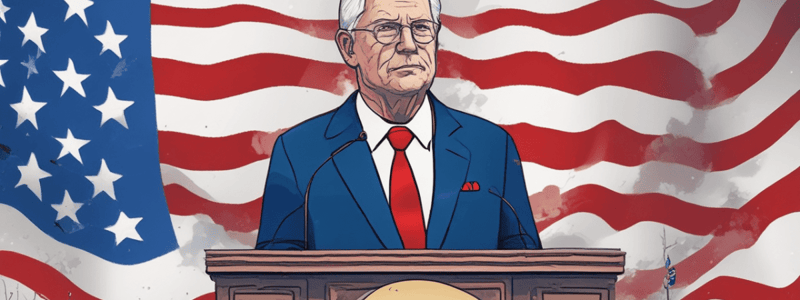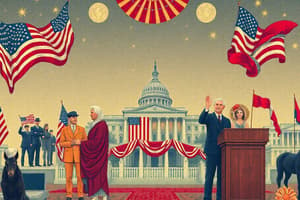Podcast
Questions and Answers
What is a primary function of political parties in the United States?
What is a primary function of political parties in the United States?
- To oversee the electoral process
- To appoint government officials
- To influence the political process through elections (correct)
- To draft laws and regulations
How have third parties typically affected the political process in the United States?
How have third parties typically affected the political process in the United States?
- By being the primary sources of political news
- By holding a majority in Congress
- By influencing the platforms of major parties (correct)
- By dominating presidential elections
What is one way citizens can become involved in the political process?
What is one way citizens can become involved in the political process?
- By voting in elections
- By running for public office
- By joining a political party (correct)
- By starting a non-profit organization
How do interest groups and the media affect the political process?
How do interest groups and the media affect the political process?
What is a result of technological advances on the political process?
What is a result of technological advances on the political process?
What is a key characteristic of the political parties in the United States?
What is a key characteristic of the political parties in the United States?
What role do political parties play in elections?
What role do political parties play in elections?
How have third parties typically affected the outcome of elections?
How have third parties typically affected the outcome of elections?
What is one way an individual can become involved in the political process?
What is one way an individual can become involved in the political process?
What is a characteristic of the distribution of political power in the United States?
What is a characteristic of the distribution of political power in the United States?
Flashcards are hidden until you start studying
Study Notes
Characteristics of Political Parties in the United States
- The two major parties in the United States are the Democratic and Republican parties, which have dominated the political landscape since the mid-19th century
- Political parties play a crucial role in elections, as they recruit and nominate candidates, provide campaign funding, and mobilize voter support
- Third parties, such as the Libertarian and Green parties, often focus on specific issues and can influence the political process by pushing major parties to address these issues
Citizen Involvement in Political Parties
- Citizens can become involved in political parties by registering as party members, attending party meetings, and participating in local party organizations
- Individuals can also volunteer for political campaigns, donate to party funds, and engage in get-out-the-vote efforts
- Joining party committees, participating in party conventions, and running for party office are additional ways to become involved
Interest Groups and the Media in the Political Process
- Interest groups, such as the National Rifle Association and the Sierra Club, lobby politicians and engage in grassroots activism to influence policy
- The media plays a significant role in shaping public opinion and holding politicians accountable through investigative journalism and fact-checking
- The media also provides a platform for political campaigns and interest groups to reach a wider audience
Methods of Influencing the Political Process
- Lobbying, protesting, and engaging in civil disobedience are ways individuals and groups can influence the political process
- Contacting elected officials, participating in public hearings, and engaging in online activism are additional methods
- Individuals can also support political causes through donations and volunteering for advocacy organizations
Technological Advances and the Political Process
- The rise of social media has changed the way politicians campaign, with many using online platforms to reach voters and build support
- Online fundraising and digital advocacy have become essential tools for political campaigns and interest groups
- Technological advances have also increased access to political information and enabled citizens to engage in online activism
Rights, Responsibilities, and Obligations of American Citizens
- American citizens have the right to vote, freedom of speech, and the right to petition the government
- Citizens have the responsibility to stay informed, participate in the political process, and respect the rights of others
- Obligations include obeying the law, paying taxes, and serving on juries when summoned
Distribution of Political Power in the United States
- Political power in the United States is distributed between the executive, legislative, and judicial branches of government
- The system of checks and balances ensures that no one branch has too much power
- The Constitution further limits power through the principles of federalism, which divides power between the federal government and the states
Studying That Suits You
Use AI to generate personalized quizzes and flashcards to suit your learning preferences.




